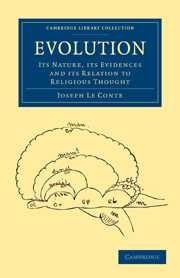Book contents
- Frontmatter
- PREFACE TO THE SECOND EDITION
- PREFACE TO THE FIRST EDITION
- Contents
- PART I WHAT IS EVOLUTION?
- PART II EVIDENCES OF THE TRUTH OF EVOLUTION
- CHAPTER I GENERAL EVIDENCES OF EVOLUTION AS A UNIVERSAL LAW
- CHAPTER II SPECIAL PROOFS OF EVOLUTION
- CHAPTER III THE GRADES OF THE FACTORS OF EVOLUTION AND THE ORDER OF THEIR APPEARANCE
- CHAPTER IV SPECIAL PROOFS FROM THE GENERAL LAWS OF ANIMAL STRUCTURE, OR COMPARISON IN THE TAXONOMIC SERIES
- CHAPTER V PROOFS FROM HOMOLOGIES OF THE VERTEBRATE SKELETON
- CHAPTER VI HOMOLOGIES OF THE ARTICULATE SKELETON
- CHAPTER VII PROOFS FROM EMBRYOLOGY, OR COMPARISON IN THE ONTOGENIC SERIES
- CHAPTER VIII PROOFS FROM GEOGRAPHICAL DISTRIBUTION OF ORGANISMS
- CHAPTER IX PROOFS FROM VARIATION OF ORGANIC FORMS, ARTIFICIAL AND NATURAL
- PART III THE RELATION OF EVOLUTION TO RELIGIOUS THOUGHT
- Index
CHAPTER VII - PROOFS FROM EMBRYOLOGY, OR COMPARISON IN THE ONTOGENIC SERIES
Published online by Cambridge University Press: 29 August 2010
- Frontmatter
- PREFACE TO THE SECOND EDITION
- PREFACE TO THE FIRST EDITION
- Contents
- PART I WHAT IS EVOLUTION?
- PART II EVIDENCES OF THE TRUTH OF EVOLUTION
- CHAPTER I GENERAL EVIDENCES OF EVOLUTION AS A UNIVERSAL LAW
- CHAPTER II SPECIAL PROOFS OF EVOLUTION
- CHAPTER III THE GRADES OF THE FACTORS OF EVOLUTION AND THE ORDER OF THEIR APPEARANCE
- CHAPTER IV SPECIAL PROOFS FROM THE GENERAL LAWS OF ANIMAL STRUCTURE, OR COMPARISON IN THE TAXONOMIC SERIES
- CHAPTER V PROOFS FROM HOMOLOGIES OF THE VERTEBRATE SKELETON
- CHAPTER VI HOMOLOGIES OF THE ARTICULATE SKELETON
- CHAPTER VII PROOFS FROM EMBRYOLOGY, OR COMPARISON IN THE ONTOGENIC SERIES
- CHAPTER VIII PROOFS FROM GEOGRAPHICAL DISTRIBUTION OF ORGANISMS
- CHAPTER IX PROOFS FROM VARIATION OF ORGANIC FORMS, ARTIFICIAL AND NATURAL
- PART III THE RELATION OF EVOLUTION TO RELIGIOUS THOUGHT
- Index
Summary
It is a curious and most significant fact that the successive stages of the development of the individual in the higher forms of any group (ontogenic series) resemble the stages of increasing complexity of differentiated structure in ascending the animal scale in that group (taxonomic series), and especially the forms and structure of animals of that group in successive geological epochs (phylogenic series). In other words, the individual higher animal in embryonic development passes through temporary stages, which are similar in many respects to permanent or mature conditions in some of the lower forms in the same group. To give one example for the sake of clearness: The frog, in its early stages of embryonic development, is essentially a fish, and if it stopped at this stage would be so called and classed. But it does not stop; for this is a temporary stage, not a permanent condition. It passes through the fish stage and through several other temporary stages, which we shall explain hereafter, and onward to the highest condition attained by amphibians. Now, if we could trace perfectly the successive forms of amphibians, back through the geological epochs to their origin in the Carboniferous, the resemblance of this series to the stages of the development of a frog would doubtless be still closer. Surely this fact, if it be a fact, is wholly inexplicable except by the theory of derivation or evolution.
- Type
- Chapter
- Information
- EvolutionIts Nature, its Evidences and its Relation to Religious Thought, pp. 148 - 182Publisher: Cambridge University PressPrint publication year: 2009First published in: 1898



